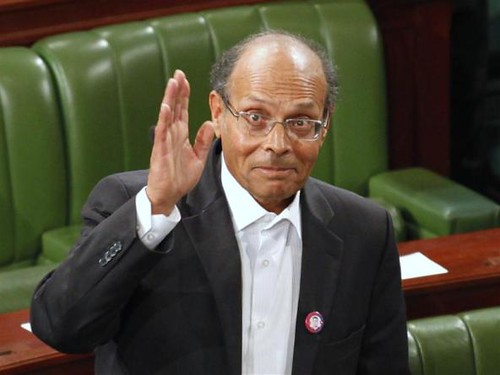
Dr. Moncef Marzouki, leader of the Congress for the Republic, has been voted by the Tunisian parliament to be the new president of the North African state. His selection was marked by controversy on the part of other secular parties., a photo by Pan-African News Wire File Photos on Flickr.
Tunisia’s Islamists Seek Compromise on Political Crisis
By Jihen Laghmari and Caroline Alexander - Feb 11, 2013
Tunisia’s most powerful Islamist party said it’s talking with partners to find a solution for the political crisis that has worsened since the Feb. 6 killing of a senior opposition figure.
Ennahda is in the process of discussing the formation of “a consensus government,” the state-run Tunis Afrique Presse news agency quoted senior party member Riadh Shuaibi as saying today.
The push by the moderate Islamist group, which is the biggest party in Tunisia’s coalition government, comes as the secular Congress for the Republic party, known as CPR, that’s led by President Moncef Marzouki, said it would delay plans to leave the Cabinet. The talks reflect broader efforts to find middle ground as the nation witnesses the worst unrest since the removal of President Zine El Abidine Ben Ali in 2011, an event that ignited the Arab Spring.
The announcements give Prime Minister Hamadi Jbeli of Ennahda more time to reach a compromise between his proposal for a new technocrat government and other calls for a unity government. The murder of Chukri Beleid, leader of the opposition Democratic Patriots, has exacerbated tensions, with secular opposition groups accusing Ennahda of colluding with extremists in the killing, a charge it denies.
“There is to some extent a softening of the tones and positions on both sides,” Riccardo Fabiani, an analyst at Eurasia Group in London said in an interview today. “It’s now time for talks and negotiations. Eventually there will be a deal, but it will probably take longer than we think.”
One Week
CPR, a secular party pivotal to the coalition government, said it will quit “once and for all” if its demands aren’t addressed within a week, Secretary-General Mohammed Abou told reporters in Tunis today. Yesterday, CPR said it was seeking the replacement of two Islamist ministers, and rejected Jbeli’s proposal to form a government of technocrats.
Abou said such a government would allow the return of figures linked to the previous regime. Ennahda also rejected the plan, saying the premier was acting unilaterally.
An alternative to a government of technocrats is the creation of “a consensus government,” Shuaibi said, adding that Ennahda wants to expand negotiations to include other parties.
The Cabinet has been paralyzed for months because of disagreements between the CPR, Ennahda and the Democratic Forum for Labour and Liberties party known as Ettakatol, the third party in the coalition government.
IMF Talks
Ettakatol “doesn’t oppose the decision to form an independent, unpartisan, technocrat government,” TAP quoted party spokesman Mohamed Bannour as saying. “Consultations with all parties are still ongoing,” he said, according to the news agency.
Tunisia’s benchmark stock index was little changed today after tumbling 3.7 percent on Feb. 6, the biggest drop since Jan. 13, 2011, the eve of Ben Ali’s departure.
Tunisia is in talks for a $1.78 billion International Monetary Fund standby loan to help buttress an economy that grew 2.7 percent last year and may expand 3.3 percent this year, according to IMF estimates.
To contact the reporter on this story: Jihen Laghmari in Tunis at jlaghmari@bloomberg.net
To contact the editor responsible for this story: Andrew J. Barden at barden@bloomberg.net
No comments:
Post a Comment